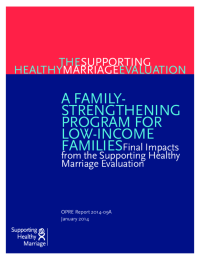A Family-Strengthening Program for Low-Income Families
Final Impacts from the Supporting Healthy Marriage Evaluation
The Supporting Healthy Marriage (SHM) evaluation was launched in 2003 to test the effectiveness of a skills-based relationship education program designed to help low- and modest-income married couples strengthen their relationships and to support more stable and more nurturing home environments and more positive outcomes for parents and their children. The evaluation was led by MDRC with Abt Associates and other partners, and it was sponsored by the Office of Planning, Research and Evaluation in the Administration for Children and Families, U.S. Department of Health and Human Services.
SHM was a voluntary, yearlong, marriage education program for lower-income, married couples who had children or were expecting a child. The program provided group workshops based on structured curricula; supplemental activities to build on workshop themes; and family support services to address participation barriers, connect families with other services, and reinforce curricular themes. The study’s random assignment design compared outcomes for families who were offered SHM’s services with outcomes for a similar group of families who were not but could access other services in the community. This report presents SHM’s estimated impacts about 30 months after couples entered the study.
Key Findings
- SHM did not lead more couples to stay together.
- SHM produced a consistent pattern of sustained small positive effects on couples’ relationships. Compared with the control group at 30 months, the program group reported higher levels of marital happiness; lower levels of marital distress and infidelity; greater warmth, support, and positive communication; and less antagonistic and hostile behaviors in their interactions with their spouses. The program group also reported experiencing less psychological abuse than the control group. These impacts are similar to the impacts reported at 12 months. Reports of physical assault at 30 months were not prevalent and were not significantly affected by SHM.
- SHM reduced women’s feelings of sadness and anxiety, but it did not significantly affect the outcome for men at 30 months. While the impact for women is small, the improvement is of interest because parental distress is linked with less positive parenting and with increased behavior problems for children.
- SHM had little effect on indicators of coparenting, parenting, or child well-being. Of the outcomes examined, only a few of the impact estimates are significant. Moreover, the magnitudes of these impacts are very small, and the results did not remain statistically significant after additional statistical tests were conducted to adjust for the number of outcomes examined.
Overall, SHM was well implemented, but it was fairly expensive to operate, and it did not achieve some of its central objectives –– increasing the likelihood that parents stayed together or measurably benefiting children living in such households. As policymakers consider possible future directions for programs that support marriage and relationships, it will be important to focus on how best to target services to those most likely to benefit, which aspects of SHM should be included in future tests, and which should be altered in an effort to bolster program impacts and reduce costs.






